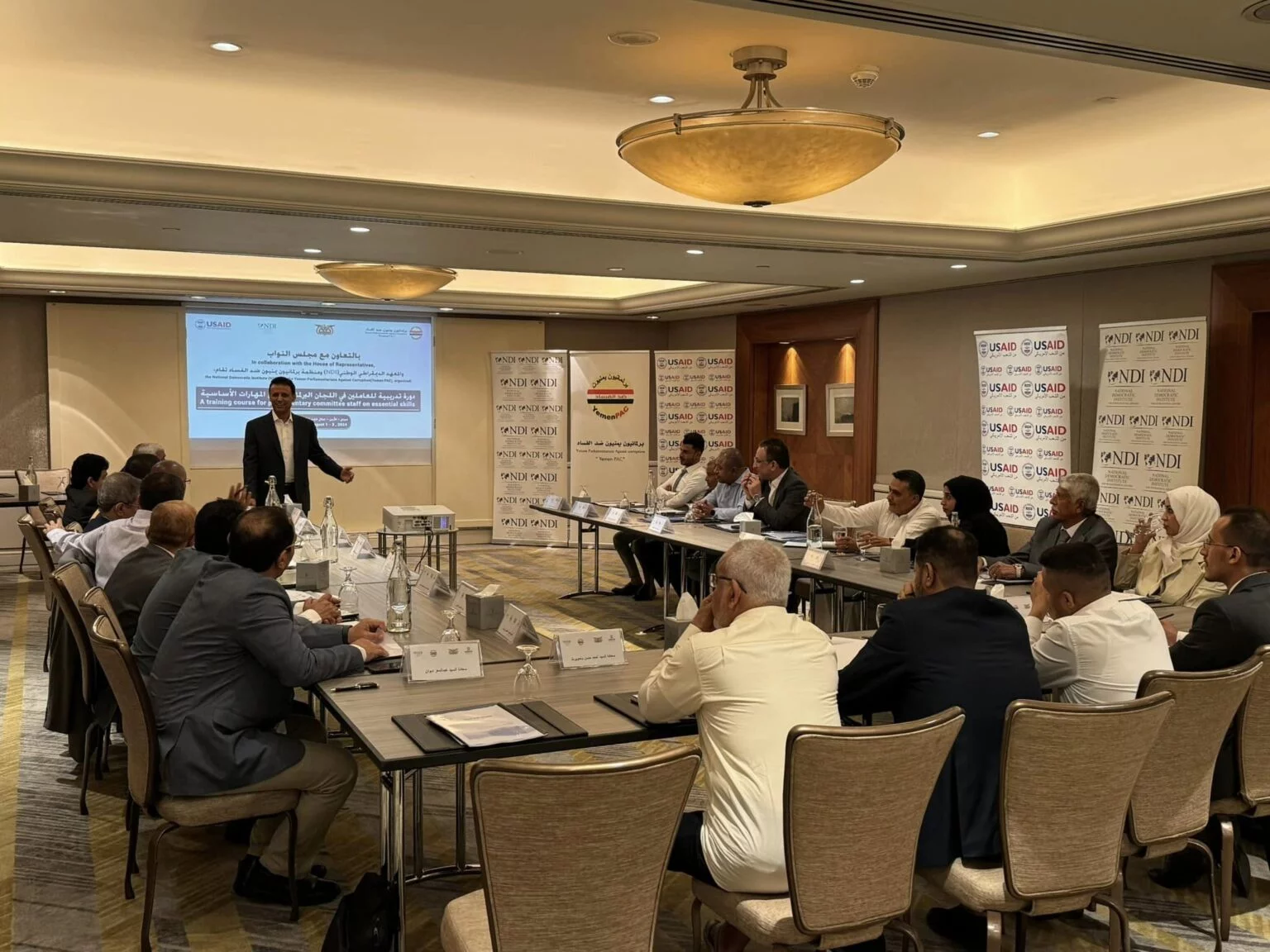A Workshop Titled “The Relationship Between the Legislative Institution and the Executive Institution”

“The Relationship Between the Legislative and Executive Institutions: Enhancing Performance and Building Trust”
Heads of parliamentary blocs in the Yemeni Parliament discussed revitalizing the Parliament and its committees during a workshop held on January 15–16, 2024.
In collaboration with the House of Representatives and the National Democratic Institute (NDI), Yemen Parliamentarians Against Corruption (YemenPAC) organized the workshop to explore similar experiences of parliamentary performance in times of crises and wars. The discussions focused on mechanisms to strengthen the relationship between the Parliament and the executive authority, improve the performance of the Parliament and its committees, and develop a future vision for this purpose.
The workshop was attended by the heads of parliamentary blocs and inaugurated by Deputy Speaker of the Parliament, Mr. Mohammed Al-Shaddadi. In his opening remarks, he commended NDI for its continuous support to the Yemeni Parliament and democratic transition in Yemen, and he thanked YemenPAC for organizing this event.
Ms. Kenza Ekratit, Senior Director at NDI, welcomed the participants, while Mr. Ali Ashal, Head of Relations at YemenPAC, highlighted the objectives of the event. He expressed gratitude to NDI for its support to both the organization and the Parliament, hoping the workshop would foster serious, effective, and fruitful discussions among participants.

In the Opening Paper Presented by YemenPAC Executive Director Abdulmoez Dabwan
The opening paper prepared and presented by Mr. Abdulmoez Dabwan, Executive Director of YemenPAC, provided an overview of Yemen’s parliamentary experience. It introduced the political system, offered a historical narrative on the emergence and development of legislative councils in Yemen before and after unification, and concluded with a focus on the current Parliament. The paper examined the Parliament’s composition, its relationship with the executive authority, and its oversight functions, including parliamentary oversight tools. It also highlighted the pivotal role of parliamentary committees as the primary mechanism for fulfilling legislative and oversight responsibilities. The paper’s content was extensively discussed as it provided a comprehensive description of the current state of the Parliament.
Presentation by Mr. David Hunter
Mr. David Hunter presented a paper on the performance of parliaments during conflicts and crises, showcasing experiences from similar parliamentary contexts and how to benefit from them. The paper emphasized that the strength of any parliament lies in its ability to assert and activate its legislative and oversight authorities, based on transparency and public engagement as a fundamental right. It also explored the relationship between the legislative and executive branches, committee operations, methods to enhance their functionality, and the importance of member training and capacity building.
Focused Discussion and Proposed Vision
A session was held to discuss mechanisms for strengthening the relationship between the House of Representatives and the executive branch. This session relied on focused discussions (a focus group) to extract proposals and ideas from participants.
Additionally, a proposed vision for enhancing parliamentary committees was discussed. This included the vision’s objectives, significance, proposed mechanisms, components, and implementation requirements. After thorough discussion and enrichment, the participants agreed to adopt and support the implementation of this vision in practice.
Concluding Recommendations
At the end of the workshop, participants called on the National Democratic Institute (NDI) to continue providing technical, logistical, and operational support to the Parliament, its committees, and parliamentary blocs. They also emphasized the importance of continued coordination between YemenPAC and NDI to provide support programs, share expertise, and facilitate experience exchange for the Parliament and its committees. Furthermore, they stressed the need for the Presidency of the Parliament and heads of parliamentary blocs to hold sessions in the temporary capital, Aden, and to complete the formation of parliamentary committees as the core structure of the Parliament’s work.

